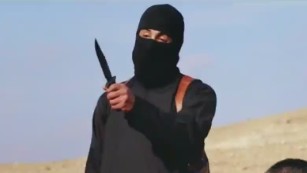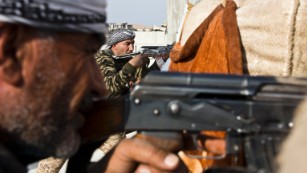(CNN)Igniting
a live man in a cage; severing the heads of dozens; kidnapping, raping
and selling women and children -- ISIS' shocking maltreatment of its
captives has become regrettably predictable.
But
that has made their latest decision on the fate of 19 Christian
prisoners all the more surprising to some. On Sunday, ISIS released
them.
Ten other Assyrian Christians are expected to join them in freedom after a short time in captivity.
All
but one of the Christians released were part of a group of 220
Assyrians captured last week during offensives on northern Syrian
villages, said the London-based Syrian Observatory for Human Rights.
In the shadow of its sadistic mercilessness, the sudden reversal leaves many asking: Why?
The group has not explained its decision. Here are some possible answers.
Who at ISIS made the decision?
It
was not a militant commander but an ISIS Sharia judge, said Osama
Edward, who heads the Assyrian Human Rights Network, based in Sweden.
Some
of Edward's family members are among the captured Christians. His
rights group keeps contact with local people, via phone and Internet,
and has a field team in Syria, he said.
The
Sharia judge asked the Christians if they were part of any militia,
Edward said. Then he pronounced them not guilty of violating Sharia law
and ordered them released.
The Assyrian Christians were all from the village of Tal Goran. They have returned home but are keeping quiet for now.
"They were so tired," Edward said. They had a closed meeting with a bishop, and then ate and went home.
"They were treated well," contacts in Tal Goran passed on to Edward. "Nobody was tortured."
Was the decision a surprise to those very familiar with ISIS?
Not to Graeme Wood, who published a detailed analysis on ISIS' religious inner workings this week in The Atlantic.
He was pleased to hear about it, but he felt it fit into ISIS' plans.
"ISIS
has claimed for a long time to follow rules, and it claims that these
Sharia courts will impose limits," he told CNN. "They can attempt to get
credibility by showing that they follow rules and that they have some
kind of transparent process that follows their particular implementation
of Sharia law."
Could it be a move to impress others?
It's possible. It did win them points with Assyrian activists. "It's a good sign to show that 'we can talk,'" Edward said.
ISIS
has taken heat even from other Islamists who accuse it of rogue
justice, especially against Muslim civilians they've condemned as
"infidels" out of hand.
It's part of
the reason al Qaeda has rejected the group, Wood wrote. That reduced
some of ISIS' chances of receiving international moral and financial
support, leaving the terror group to make up the gap with other funding.
And it has led to a violent split with another jihadi group in Syria, the al-Nusra Front, according to The Washington Institute for Near East Policy. Other Islamist groups in Syria have frowned on ISIS for not submitting to decisions from Sharia courts.
Why go easier on a group of Christians?
The
main issue drawing anger from other Islamist groups revolves around
Muslim civilians, who are ISIS' most common victims. And the released
captives are Christians.
But Christian
activist Edward thinks the ISIS Sharia court decision was, in part, a
nod to Syrian Sunni Muslim tribal leaders who negotiated for the
Christians' release.
First, the tribes
care deeply about their Christian neighbors and don't want them killed,
Edward said. It also makes the Sunni tribal leaders look good and gets a
rapport started between them and ISIS.
Why does ISIS target other Muslims most?
ISIS
has a very narrow definition of who is a real Muslim and who is an
apostate. Foremost, a Muslim must practice Sunni Islam in its eyes.
The
group is quick to practice "takfir," which amounts to the
excommunication of a Muslim, for things as seemingly petty as shaving
off one's beard or voting in an election. ISIS is quick to kill anyone
it condemns, because it wants to create a fanatically pure caliphate with only the strictest devotees, Wood wrote.
ISIS has executed 125 of its own members for doing things that broke with its strict take on Islam, the Syrian Observatory said.
Could the Sharia judge's decision to release the Christians be a routine one?
Yes. Even in the strictest interpretation of Islam, there is a provision for sparing Christians, Wood wrote.
Social
media posts indicate that ISIS carries out mass killings regularly, but
"exempted from automatic execution, it appears, are Christians who do
not resist their new government." They are required to pay a special tax
and acknowledge the new ruling power.
That's exactly what the judge ruled, Edward said.
The released Assyrian Christians agreed to acknowledge ISIS as their new masters and to pay the tax.
ISIS
is still holding two of Tal Goran's Christian villagers, Edward said.
They should be released as soon as the taxes are paid.
He is hoping for the same deal for the other Christian villagers, including for his family.





No comments:
Post a Comment